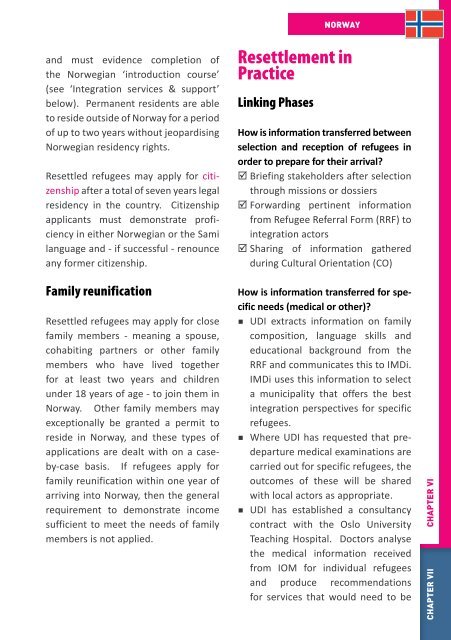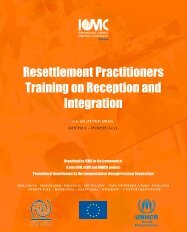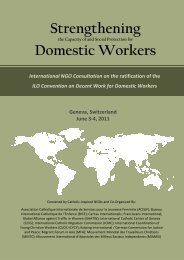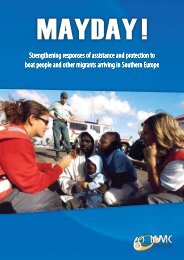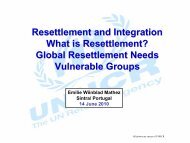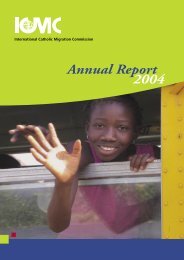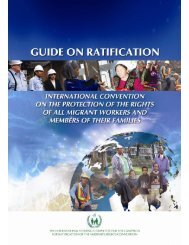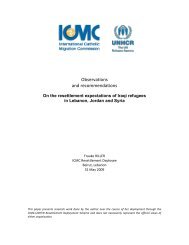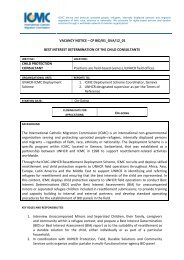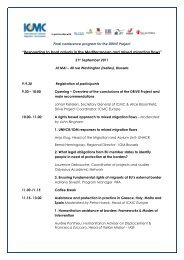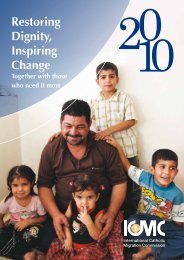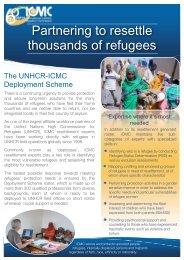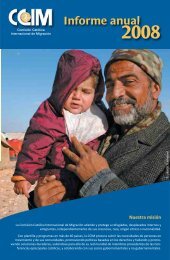ICMCEUROPE WelcometoEurope.pdf (5.89 MB)
ICMCEUROPE WelcometoEurope.pdf (5.89 MB)
ICMCEUROPE WelcometoEurope.pdf (5.89 MB)
Create successful ePaper yourself
Turn your PDF publications into a flip-book with our unique Google optimized e-Paper software.
Norway<br />
and must evidence completion of<br />
the Norwegian ‘introduction course’<br />
(see ‘Integration services & support’<br />
below). Permanent residents are able<br />
to reside outside of Norway for a period<br />
of up to two years without jeopardising<br />
Norwegian residency rights.<br />
Resettled refugees may apply for citizenship<br />
after a total of seven years legal<br />
residency in the country. Citizenship<br />
applicants must demonstrate proficiency<br />
in either Norwegian or the Sami<br />
language and - if successful - renounce<br />
any former citizenship.<br />
Resettlement in<br />
Practice<br />
Linking Phases<br />
How is information transferred between<br />
selection and reception of refugees in<br />
order to prepare for their arrival?<br />
Briefing stakeholders after selection<br />
through missions or dossiers<br />
Forwarding pertinent information<br />
from Refugee Referral Form (RRF) to<br />
integration actors<br />
Sharing of information gathered<br />
during Cultural Orientation (CO)<br />
Family reunification<br />
Resettled refugees may apply for close<br />
family members - meaning a spouse,<br />
cohabiting partners or other family<br />
members who have lived together<br />
for at least two years and children<br />
under 18 years of age - to join them in<br />
Norway. Other family members may<br />
exceptionally be granted a permit to<br />
reside in Norway, and these types of<br />
applications are dealt with on a caseby-case<br />
basis. If refugees apply for<br />
family reunification within one year of<br />
arriving into Norway, then the general<br />
requirement to demonstrate income<br />
sufficient to meet the needs of family<br />
members is not applied.<br />
How is information transferred for specific<br />
needs (medical or other)?<br />
• UDI extracts information on family<br />
composition, language skills and<br />
educational background from the<br />
RRF and communicates this to IMDi.<br />
IMDi uses this information to select<br />
a municipality that offers the best<br />
integration perspectives for specific<br />
refugees.<br />
• Where UDI has requested that predeparture<br />
medical examinations are<br />
carried out for specific refugees, the<br />
outcomes of these will be shared<br />
with local actors as appropriate.<br />
• UDI has established a consultancy<br />
contract with the Oslo University<br />
Teaching Hospital. Doctors analyse<br />
the medical information received<br />
from IOM for individual refugees<br />
and produce recommendations<br />
for services that would need to be<br />
CHAPTER VI<br />
CHAPTER VII


